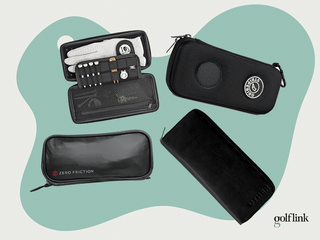Earnings of a PGA Tour Caddie: Salary Plus Winnings

After every PGA Tour event, it’s easy to find a list detailing exactly how much each player made. There’s one mystery question, however, that’s not so easy to answer: How much do caddies make?
It used to be considered a foregone conclusion that PGA Tour caddies earned a weekly salary plus 10 percent of their player's tournament winnings for that week. That's not necessarily the case anymore.
Let's look at some of the variables that influence how much money caddies make, and which loopers are taking home the most money.
How Much Do Caddies Make?
- A caddie’s pay is a combination of a weekly stipend plus a percentage of a player's winnings
- Every player/caddie agreement is different, but a base of between $1,500 and $3,000 per event to cover travel expenses is pretty standard
- Players then share a percentage of winnings with their caddie, with a standard split being 5% of winnings for a finish outside the top 10, 6-8% for a top-10 finish, and 10% for a win
In every player/caddie agreement, the two parties agree to terms that fit their own needs. That could mean some caddies get a greater weekly salary and a lower percentage of winnings, or vice-versa.
In addition, travel and hotel costs are negotiated, and some players cover those costs for their caddie as well.
Caddies can also earn money from sponsorships. While not to the extent of players, caddies can make money by wearing a sponsor’s logo on a hat or on their shirt sleeve.
How Pros Select a Caddie
There are several ways players select their caddies on the PGA Tour. More often than not, a pre-existing relationship exists. The most likely relationships include a close friend, coach, or a caddie who has been on tour and is looking for a new employer.
Beyond those more common relationships, you also see siblings, spouses, siblings-in-law, and even lower-level professionals who haven't made it to the PGA Tour.
The Role of a Caddie Has Changed
For decades, the role of a caddie was pretty cut and dry. The caddie was in charge of carrying the bag, cleaning clubs, replacing divots, helping read putts, and scouting the course.
Today, a caddie tends to be so much more in addition to the above. We see caddies as very close members of a PGA Tour pro's inner circle. You'll even see caddies acting as crowd control for their player, and sometimes even their driver to and from the golf course.

How to Be a Good Caddy: 4 Key Skills to Have
Time and Education Requirements
Most caddies work 30 weeks a year or less. This leaves almost 40 percent of the year free for them to pursue other jobs or enjoy their free time. There is little to no required education or experience needed to become a PGA Tour caddie, so many caddies start working right after high school or college. What matters most is building up a reputation as a knowledgeable caddie.
Which Caddies Make the Most Money?
If you want to know which caddies make the most, just check out which players make the most. Sure, every player-caddie agreement is different, but the still follow the same general outline.
In 2024, Scottie Scheffler won six times and collected more than $54 million in on-course earnings.
We don’t know the specific arrangement Scheffler and his caddie Ted Scott have, but for some back-of-the-napkin fun, let’s assume a weekly $3,000 stipend for each of Scheffler’s 19 PGA Tour starts (not including the Olympics), and a 5-7-10 payout, meaning 5% for a made cut, 7% for a top-10, and 10% for a win.
That shakes out to $5,174,649.57 for Scott for 2024 alone.
For context, only 22 PGA Tour players – yes, the players themselves – made more than that on the course in 2024. That would make Scott’s 2024 on-course earnings better than that of players like Viktor Hovland, Tommy Fleetwood, Max Homa, Matt Fitzpatrick, and Jordan Spieth.
Considering that the average tour player earned a little more than $2 million on the course in 2024, it’s reasonable to assume that the average caddie hauled in somewhere between $100,000 and $150,000 between weekly pay and winnings.

The 5 Best Golf Glove Holders You Didn't Know You Need